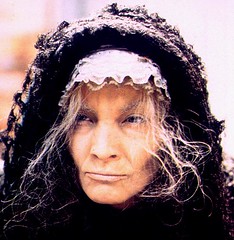Now that we're on the subject of emotions, I might as well upload this:
Human emotions have deep evolutionary roots, a fact that may explain their complexity. What is an emotion? More than 90 definitions have been offered over the past century, and there are almost as many theories of emotion—not to mention a complex array of overlapping words in our languages to describe them. Robert Plutchik offers an integrative theory based on evolutionary principles. Emotions are adaptive—in fact, they have a complexity born of a long evolutionary history—and although we conceive of emotions as feeling states, Plutchik says the feeling state is part of a process involving both cognition and behavior and containing several feedback loops.
This three-dimensional model describes the relations among emotion concepts, which are analogous to the colors on a color wheel. The cone’s vertical dimension representsintensity, and the circle represents degrees of similarity among the emotions. The eight sectors are designed to indicate that there are eight primary emotion dimensions defined by the theory arranged as four pairs of opposites.
Generally, humans seek to re-establish an equilibrium state in their inner emotional life. In human experience it is common to use the term “emotion” to describe the feeling state, but in fact emotion is considerably more complex.
Robert Plutchik, author of "The Nature of Emotions" created a wheel of emotions in 1980 which consisted of 8 basic emotions and 8 advanced emotions each composed of 2 basic ones, here's what that looks like:
Basic Emotion -- Basic Opposite
- Joy -- Sadness
- Acceptance -- Disgust
- Fear -- Anger
- Surprise -- Anticipation
- Sadness -- Joy
- Disgust -- Acceptance
- Anger -- Fear
- Anticipation -- Surprise
The article goes on and on... drones actually... and I found it really intriguing that there can be so much intellectualizing and labeling and categorizing something which I think defies the intellect, resents being labeled, cannot be contained, and must be allowed to the freedom to just BE.
That being said, here we have the last of it, which I uploaded as a separate post because a small portion of it is actually interesting to me: General Principles for Working With Emotions




.jpg)











1 Comment:
I sincerely enjoyed reading your articles on emotion.
I'm curious, though...do you know of any written works or a named therapy that deals with the release of stored emotions/issues in the body? For instance...money issues create tight gluts...or same sex issues (ie; mom, sister, aunt, if you're female...dad, uncle, brother, if male) are stored in the right trapezius while opposite sex issues (female having difficulties with male boss, male having difficulties with sister-in-law) are stored in the left trapezius.
Thank you!
Loretta
Post a Comment
I love and appreciate comments - however - comment spam will be deleted when discovered. A big thank you to every one else for taking the time to put your two cents in.